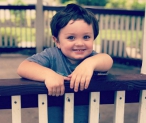Altered Cerebral Blood Flow after Pediatric Posterior Fossa Brain Tumor Treatment

Background
Many childhood brain tumor survivors have long-term consequences of treatment, including both learning and physical disabilities that can impact their quality of life. A new magnetic resonance imaging (MRI) technique, pseudo-continuous arterial spin labeling (pCASL), measures blood flow in the brain by using non-invasive magnetic labeling of blood. Earlier research revealed evidence of chronic injury to multiple brain structures far beyond the tumor site in children years after treatment with high dose chemotherapy, but the exact mechanisms of this injury are unclear.
Project Goal
The purpose of this study is 1) to investigate changes in blood flow in the brain as a possible factor related to subtle brain injury by comparing blood flow among 20 children ages 6-17 years with brain tumors in the cerebellum, treated with either surgery or standard treatment at least one year prior to study enrollment, and 10 healthy sibling controls; and 2) to determine the relationship of changes in blood flow to brain structural injury and to cognitive and quality of life (QOL) outcomes. This study, the first to our knowledge to use pCASL in this population, will provide new information about altered blood flow in the brain as a possible mechanism of injury after childhood brain tumor treatment, creating a base of knowledge upon which to build interventional research. Possible interventions to improve cerebrovascular functioning include exercise and antioxidants.
"I am so thankful for this grant that is allowing me to continue my research on the effects of cancer treatment on the child's brain; with these funds, I am able to explore whether changes in blood flow to the brain after treatment may be a factor in subtle brain injury in childhood brain tumor survivors. By adding to our knowledge of the mechanisms of injury to the brain from cancer treatment, it is my hope that we can develop ways to mitigate long-term cognitive deficits in this population."

